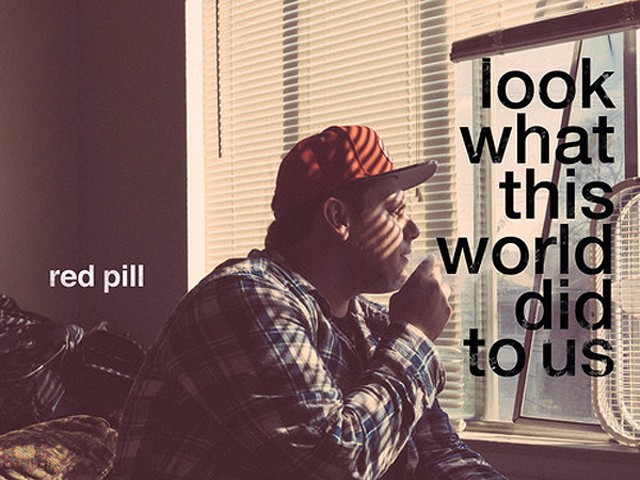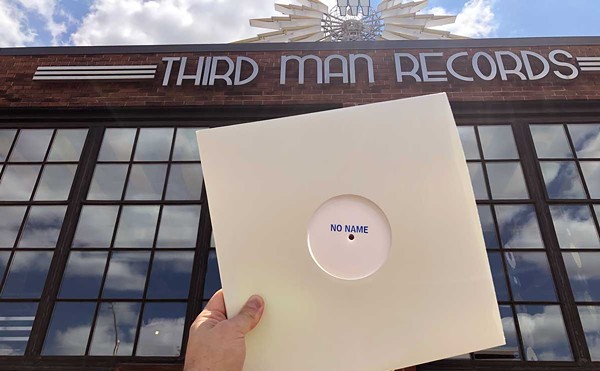Sir Richard Bishop is a tall, gregarious, and naturally curious dude with little time for bullshit. He's also one of the greatest guitarists alive, and has been for some time. Bishop has a natural and deep grasp of dozens of styles and genres, from the Basho realms to Django country. Crucially, the guy is also smart enough to know that it's really fun to just play "Radar Love" for at least 10 minutes.
I've been a fan since the early 1980s — back when he was just Rick Bishop, guitarist in the Phoenix-based Sun City Girls. A friend dragged me to see this band JFA because they were the first punk band to have their own skateboard. And then the Sun City Girls opened up, and they just shredded this barrage of satirical, spazzy noise, all while decked in Jawa costumes (in hot and humid Miami) for the entire show. And even though he played Trinosophes as recently as last September, you should be sure to not miss Sir Richard Bishop when he plays this week, as he's going to do most of the set with all new material on a new-to-him 160-year-old acoustic guitar. He used it exclusively on his new album, Tangier Sessions (Drag City).
Metro Times: Starting with your Michigan roots, since I'm calling you from there. I'm curious how you feel connected to Saginaw, where you grew up?
Richard Bishop: At the time, Saginaw was fine, I guess. I've only been back there once since we moved to Arizona. I went back to Saginaw for a 10-year high school reunion. It was almost unrecognizable. In just those 10 years, it had changed a lot. A lot of people had just bailed. The main reason was to see old friends who were very close when I was living there. And it didn't take long to see that there wasn't a lot in common anymore. So I don't really have a lot of attachment to Saginaw, but I do like coming through Detroit. And I've been lucky enough to do that for the last few tours.
MT: The back story of this record kind of sounds like bullshit, like you're trying to make a Disney movie or something, about a magic guitar.
Bishop: Everything about the history of this record is 100 percent true.
MT: I figured it was; I was just making a joke!
Bishop: What's interesting is the way it all played out. I got the guitar and knew I was going to Morocco to do a show. It just turned out that there was time to record the new guitar, which I didn't have a lot of experience with then. After the first few days there, I realized it would be great if I could just make a record of it, and I had a digital recorder with me. The history of me finding the guitar and the mystery of the instrument has become just as much part of the album as the music. And that's the first time anything like that has really happened. I'm pleased with that because it's a very special guitar, a magical little thing.
MT: So, let's back up. You were in Switzerland as part of an artist residency in Geneva?
Bishop: And I was about to, within a month or so, I was going to go to Thailand for four months. I had an electric guitar with me in Geneva. I decided if I'm going to be in Thailand for four months I'm probably going to miss not having a guitar. On a previous trip, I didn't take a guitar that was a mistake. I was trying to find a mini guitar. I used to have one of these little guitars that was pretty well made and easy to carry and sounded good, but I couldn't find one for a decent price in Geneva because everything there is priced about $200 more than it would anywhere else in the world.
I kept looking and looking, and when this [shopkeep] put this guitar in my hand, there was an instant connection. I didn't know if it was good or bad — it just had an energy. The more I played it, the more I got attached, and the more I found it difficult to put down. Of course when I found out the price, it was way more than I was planning to spend, even at inflated Geneva prices. But when I walked away from it, it occupied my thoughts, waking and sleeping. It required me to keep going back to try it again to see if it had the same kind of feel to it and it really was indeed something special to me. I just had to have it. There was some weird connection. It was frightening to take this guitar to Thailand at first. But it had a hard shell case custom made, and it was small, so I just decided to do it. I was lucky enough that it was small enough to fit in the overhead bins, especially on international flights.
MT: Why, when you were going there, did you feel the need to have a guitar — to play with people in Thailand?
Bishop: No. It was just to be able to play the guitar, because that's what I do when I'm sitting at home. On that trip I visited India and Thailand and there are times when there's nothing to do, when things close up or whatever, and you want to have something to do.
MT: What was the purpose of that trip?
Bishop: It was just relaxation after six months of work in Geneva. I went there with [girlfriend and graphic designer Kate Widdows] so it was just a way to get out of Geneva, to go from one of the most expensive countries in the world to a relatively inexpensive and easy to get around place, with no schedule. We had the idea to get away as long as we could, until the money ran out, and we lasted about a year.
MT: If you could live that way, would you just be a nomadic person?
Bishop: Yeah, I think I could. It's just not convenient all the time, because of other people that you're involved with. If I was just some weird, solo dude cruising around, then absolutely. I would probably really dig that. But, you know, you gotta work.
MT: Do you think that's part of why you're a musician? Travel is baked into the job description.
Bishop: Yes. It's related. I started getting the travel bug right at the beginning of being a somewhat established musician. And when you're a solo instrumentalist of any portable instrument, the travel works well with that.
MT: Another thing that has changed with the transition from being in a band to being a solo musician is your relationship to the audience. One thing that I think everyone loved about the Sun City Girls was how you really never knew what you were going to get, and sometimes it was this weirdly antagonistic experience.
Bishop: I know what you mean. It's totally different now, of course. It's not going to be some weird Kabuki thing with masks which may or may not be musical. I miss that a little bit, because it was such a huge part of my history of being a musician. And there's strength in numbers when you have a group like that which can create a lot of different things: good, bad, ugly, whatever. But now it's just a lot more personal and a lot more personable. I don't really get heckled! I kind of miss that. I'm playing this decent guitar material that I'm happy with, and most of the time it goes over pretty well. There's not a lot of mystery involved; I don't always know what I'm gonna play, but it will be a similar kind of approach, depending on the atmosphere of the room and who's around. I don't want to say it's going to be straightforward, but it's much more straightforward than in that past. And I still have the occasional work with [the band] Rangda, with Ben Chasny and Chris Corsano, which is totally different than Sun City Girls, but it has a similar type of power structure to it. But I always fall back on the solo thing, because that's really what I do now. I always hoped that it would be this, where I could make a living playing music as opposed to working for other people. But of course I had in there a history of bookselling, which I still do a little bit now and again, because it's something I like to do.
MT: When you travel, do you go around and look for books?
Bishop: Yes. For a spell in the last few years I didn't do that as actively as I had done in the past, but now I'm back into that search, that hunt for weird things in out-of-the-way places. It's just getting difficult because everybody knows what they have. The music is still going to take priority over everything. But there are times when you're not touring and you're just sitting on your hands and you need something else to do.
MT: On this record, what percentage of what I'm hearing is improvised and what percentage is just a song?
Bishop: This record is 100 percent improvised, and I have to explain that nothing was written ahead of time. There was nothing composed. There were a few tracks on the record which ended up as second or third takes, and how that works is that if you're improvising something off the cuff and you realize that it's not going in the direction you want it to or you make a mistake, you try it again and use some of those ideas from the first or second take. It's still improvised; you're using an idea you remembered from 20 minutes prior. I got lucky too, because a lot of it doesn't sound improvised. I'm not one to just sit down and write a song very easily. It's a struggle. I find that if I don't struggle and just let things flow and happen in a natural way, then ideas can assemble themselves into something coherent, which I can work on. I like to let it go, start to finish, and just see what happens.
MT: I'm really impressed that a record like this that is all improvised sounds so different from track to track. For you, is it as if different musical styles or genres are like languages that you can flip on and off?
Bishop: I mean, to a degree. I can always flip into the Middle Eastern, North African vibe, and I can also go into the Indian music thing.
MT: The last song on Tangier Sessions, "Let It Come Down," sounds like a British folk song to me, just simple and traditional.
Bishop: Yeah. Some other people have said a similar thing. That particular song is out of character for me; it's pretty straightforward. It's kind of a beautiful little song, and is mostly in a major key. That was just the result of messing around with three chords as opposed to trying to crowd in more chords or segments. I decided to just keep it simple. And the more I played it, it didn't need to go anywhere else. And it happened to be the last song on the record. It's kind of funny how after the guitar does a lot of exploring, this song kind of ends the record and brings it down to something mellow and smooth. It works out nicely.
Sir Richard Bishop performs at Trinosophes (with Robert Millis from the Climax Golden Twins opening up) on Tuesday, April 7 at 9 p.m.; 1464 Gratiot Ave., Detroit; $8.






